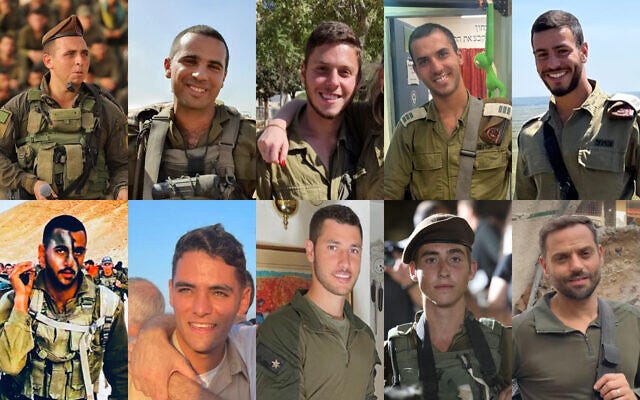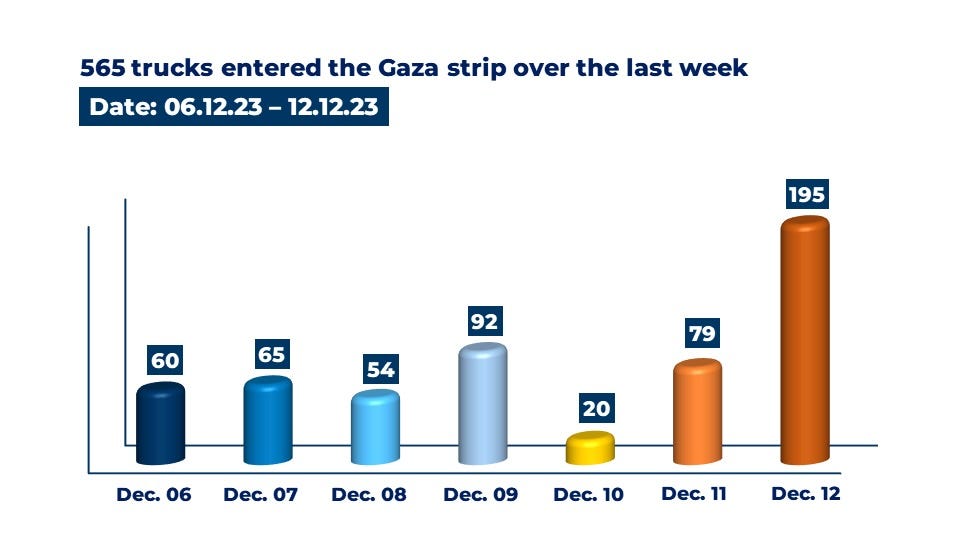DAY 68 OF THE GAZA WAR: Day of Pain and Sorrow, Biden Meets Hostage Families, Who Art the Houthis?
Tel Aviv Diary December 13, 2023
Last night, as I glanced through my notes to prepare the daily update, I was just about to write that, thankfully, there had been no announcements of new soldier fatalities. Sadly, I then started hearing rumors of a fierce battle taking place inside Shuja’iyya, in which we had suffered significant losses. Sorrowfully, when I woke up this morning, the rumors turned out to be true, and indeed it was the worst day of the war, since the awful day when the war began.
The ferocious battle took place in the Casbah of Shuja’iyya. Troops from a tank brigade were clearing three large buildings to both ensure there were no terrorists inside, and to search for tunnel entrances. As the soldiers entered, they were attacked by Hamas terrorists who unexpectedly emerged from a tunnel. All of the soldiers present in the Casbah were wounded and eventually killed.
Contact with the forces was lost. A number of commanders, including a Colonel and the lieutenant colonel (commander of the Golani Brigade), along with two majors who were company commanders, immediately rushed to the location. Members of the Air Force’s elite 669 rescue unit also arrived at the scene. There was fear the soldiers were being abducted into a tunnel — which brought back memories of the kidnapping of the bodies of Hadar Goldin and Oron Shaul in 2014 (and whose bodies have still not been recovered.)
When Unit 669 attempted to enter the building, two members of the team (including the commander) were killed at the entrance. A few soldiers then managed to enter the building. The Golani Brigade commander and his troops entered a second building to provide cover for the forces, but they too were wounded and killed by an explosion. Eventually, a force from the Golani Reconnaissance managed to break through, killed the terrorists, and retrieved the bodies of the original four soldiers.
Top: L-R: Maj. Roei Meldasi (23), Lt. Col. Tomer Grinberg (35), Sgt. Achia Daskal, Maj. Moshe Avram Bar On (23), Cpt. Liel Hayo (22); bottom: Staff Sgt. Oriya Yaakov (19), Sgt. First Class Rom Hecht (20), Maj. Ben Shelly (26), Sgt. Eran Aloni (19), and Col. Itzhak Ben Basat (44).
Today has been an exceptionally difficult day in Israel, marked by yet another day of profound grief and sorrow. Lt. Col. Tomer Grinberg was among today’s fallen. Grinberg was well known throughout Israel as the commander of Battalion 13; the battalion which lost 47 soldiers on October 7th. Grinberg began October 7th at home. When news of the massacre in progress spread, Grinberg rushed to the scene, saving many. Sadly, when he reached the Gaza Envelope, it was already too late to save many from his unit (which lost more soldiers on October 7th than the battalion had lost in all the wars of Israel combined.)
Those of us who watch Channel 13 cannot forget the interview with Grinberg inside Gaza, during which the Lt. Col. was shown a message from his 3-year-old daughter. Grinberg said, “I hope she’s not mad at me for being away from home for over a month.” He continued, “I hear when kids are young they get angry, but when they are older, that turns to appreciation.” Heartbreaking. In this war, to date, the Golani Brigade has lost 82 soldiers, including those killed in the massacre of the first day.
HUMANITARIAN AID
The Kerem Shalom Crossing is now being used to inspect incoming aid shipments. This has resulted in a substantial increase in the quantity of aid entering Gaza
.
IN THE NORTH
The Lebanese front remained active today, with a resumption of fire, mostly along the border. There is talk of an American initiative to persuade Hezbollah to move back from the border, as part of an agreement that would also include resolving the border disputes between Lebanon and Israel. There are seven points along the border that are in dispute. Israeli sources have not dismissed the US proposal. To me, the US proposal seems like the only solution short of full-scale war.
IN THE WEST BANK
Israeli forces have been operating for a day and a half in Jenin. They destroyed a weapons lab and killed 8 militants. Over 2,000 Palestinians, most of whom are members of Hamas, have been arrested in the West Bank, since the beginning of the war.
A disconcerting poll was released from Ramallah today, indicating that 72% of respondents thought that the Hamas attack on October 7th was “the right move”, the same 72% stated that “Hamas has performed well in the war and that it would return to power after the war.” 90% said that President Abbas should resign.
NEGOTIATIONS FOR THE RELEASE OF ADDITIONAL HOSTAGES
There has been talk about new negotiations for the release of additional hostages. Regrettably, these discussions are not going anywhere. The government decided against sending the head of Mossad to Qatar to try to re-start negotiations. There was some disagreement among the members of the war cabinet about this matter. However, this tactical disagreement is purely academic, as it seems Hamas has no interest in negotiating any deal that does not include an end to the war and our complete withdrawal from Gaza — with them remaining in power.
BIDEN MEETS WITH RELATIVES OF AMERICANS HELD HOSTAGE BY HAMAS
President Biden met with the relatives of the hostages who possess American citizenship and told them not to lose hope. The hostage relatives are also expected to meet with CIA Chief William Burns.
HOUTHIS
The Houthis fired missiles at a tanker carrying jet oil today. Fortunately, they missed. A US destroyer intercepted two attack drones launched by the Houthis. So far, no action has been taken against the Houthis.
Who are the Houthis? The Houthis, officially known as Ansar Allah (Supporters of God), trace their origins to the early 1990s in northern Yemen, specifically in the Saada Governorate. They emerged from a Zaidi Shia revivalist movement led by Hussein Badreddin al-Houthi, after whom they are named. The movement initially focused on religious and educational activities, aiming to protect Zaidi cultural and religious identity against perceived encroachment by Sunni ideologies.
During the 1990s and early 2000s, the group's discontent grew due to socio-economic neglect, political marginalization, and foreign interference in Yemen's affairs they also capitalized on the feeling of resentment in the Saada providence that they were not getting the proper resources from the central government. Furthermore, the Houthis complained that their religious adherents were being discriminated against when trying to get government positions.
The situation escalated into armed conflict in 2004 when the Yemeni government, led by President Ali Abdullah Saleh, attempted to arrest Hussein al-Houthi, accusing him and his movement of seeking to overthrow the government and implement Shia religious law. Hussein al-Houthi was killed in the conflict, but this marked the beginning of a series of six wars between the Houthis and the Yemeni government, stretching until 2010. The Houthis transformed from a small insurgent group into a significant military and political force. Houthis capitalized on widespread discontent in Yemen against the government to expand their influence beyond their traditional strongholds.
The Arab Spring of 2011, marked by mass protests against President Saleh, significantly altered Yemen's political landscape. Saleh was eventually ousted in 2012, handing over power to his deputy, Abdrabbuh Mansur Hadi. However, this political transition failed to stabilize the country or address the Houthis' concerns, and by this time, the Houthis began receiving substantial assistance from Iran.
In 2015, a Saudi Arabia-led coalition, fearing an Iran-supported regime nearby, intervened in Yemen to reinstate the Hadi government. This intervention led to a prolonged, destructive conflict, estimated to have caused over 100,000 civilian deaths. A fragile ceasefire has been in effect since 2018.
The Houthis have always vocally supported the Palestinians. Their direct involvement in our war now likely stems from a combination of three factors: 1) acting on behalf of their Iranian supporters, 2) genuine concern for the Palestinians, and 3) showcasing their military prowess to strengthen their position in ongoing negotiations with Saudi Arabia for lasting peace. So far, they have not faced consequences for their intervention. Let's hope this changes.
BUSINESS
The CorrActions, which is developing technology to prevent road accidents through monitoring the driver's brain activity, has raised $7.25 million in Series A funding. The round was led by the Volvo technology fund, and was joined by BlackBerry, which provides operating systems for vehicles. Also participating in the round were Next Gear Ventures, Mobilitech Capital, Regah Ventures, OurCrowd, NextLeap Ventures, and Stone Ventures.
CorrActions was founded in 2019 by Dr. Elad Hochman, a neuropsychologist and scientist, and Tzvi Genosar. The company has developed technology that monitors the driver's brain activity through information from sensors in the vehicle that monitor involuntary micro-movements of the body's muscles, which are influenced by brain behavior and reflect the driver's level of functioning, including drunkenness, fatigue, and distraction.
The startup company CitrusX, which is developing a platform for the explanation of artificial intelligence models, has completed a Seed funding round of $4.5 million. The round was led by the Canadian-Israeli fund Awz Ventures, with participation from private investors.
CitrusX today unveils its AI-Explainability platform that it developed, addressing a growing problem in organizations that integrate artificial intelligence into their services. The platform allows for the explanation and validation of artificial intelligence models and provides critical information to various organizational roles responsible for managing risks.








Thanks for your detailed summary of the situation. What we are witnessing is the result of weak, misguided, and ineffective American leadership. There can be no resolution to the Israeli-Palestinian Conflict without outside pressure. People like John Kerry, posited that there could not be peace between Israel and Arab Countries without the Palestinians and Israeli making peace were clearly and obviously wrong. Great progress took place between 2017 and 2020. American leadership, combined with outside-the-box thinking and showing respect to the Sunni Arab Countries and their leaders, led to the Abraham Accords and good relations between those countries and the US. The Biden Administration destroyed this progress and went back to the policies of appeasement with both the Palestinians and Iran. It can be argued that this horrible policy enabled the October 7th Attack. The Biden Policies have clearly led to the degradation of the American relationship with Saudi Arabia and other Sunni Arab Countries.
It's remarkable that some people continue to think that the Israeli-Palestinian Conflict can be solved by the parties themselves. Israeli leaders are obviously not able to make progress, nor will they ever be without outside help. Without pressure (and a lot of incentives) from the Sunni Arab Countries - specifically Saudi Arabia and Egypt - there will be no progress or solution. The only hope is that there is a positive change of American Leadership one year from now that understands this. Those who supported and voted for the current American Leadership are, in great part, to blame for the current situation.